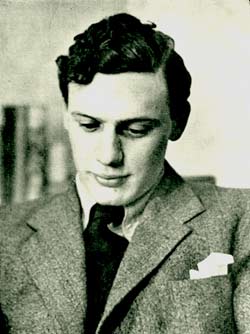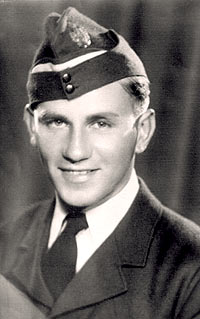|
(And therein is contained, along with their own inability to speak, what has been to Kerr and Pfeiffer’s disadvantage: that records from the time, though firm, would seem to have been disregarded, as if Angry Penguinism, through its later Heide and Ern Malley juggernauts, wanted perception of a different genesis — one that rested with surviving, ongoing players alone.)

Donald Kerr
Minutes taken at the annual general meeting of the Adelaide University Arts Association on 7 April 1940 (in Kerr’s hand, he being the elected secretary) show a motion was put, that due to the demise of the Student Union publication Phoenix the Arts Association should publish ‘a literary magazine’, commencing that year. The motion nominated C.R. Jury as the magazine’s patron, D.B. Kerr and M.H. Harris as editors, and P.G. Pfeiffer and G. Dutton as subeditors. The motion was carried and at the subsequent monthly meeting of the Arts Association (8 May), with Kerr now president, was put and carried again.
That magazine was Angry Penguins, and its sole raison d’être was to replace Phoenix, its precursor literary journal that had angered conservative elements at the university, who had wanted it quashed. The editor of Phoenix had been Kerr, and its 1939 last issue attracted the comments of Jury even years later on a radio arts program: ‘I thought then, and still think, that, qualitatively it was by far the best literary document produced by undergraduates that I had, have, ever seen.’
As well, during the last embattled year of Phoenix, Kerr had said in an interview with another university (Student Union) publication, On Dit, that ‘as the editor this year of Phoenix I may say that I regard it as one of the few brightly shining lights in this University, and, as an unbiased member of the Union, I say I should be very sorry indeed to see the light blown out’.
With his transition from Phoenix to Angry Penguins, then, Kerr was to be, as well as the latter’s founding editor, its promotional voice, as material of the time regarding circulation matters show. And the first Angry Penguins editorial was Kerr: ‘Last year Phoenix went, and thus was happily consummated a failure to understand which had started with the first number. The production of this magazine will appear then an act of defiance, and indeed it is, but defiance is a dish to be eaten cold.’
In the issue following Kerr’s death, Angry Penguins, by then under the editorship of Harris due to Pfeiffer and Dutton also having departed for wartime service, said of Kerr in obituary that his death amounted to the loss of one of the country’s finest poets — and stated that he had been the journal’s founder. In addition to the obituary, Harris contributed a long elegiac to Kerr; for the most part, it was in a young Harris’s Pelvic-Rose style, but in places a simplicity of statement still emerged, clearly expressing Harris’s regard for Kerr’s poetic ability (which is also suggested by Harris’s mention of Kerr in ensuing years, in his own poetry).
Also in 1943 a posthumous volume of Kerr’s collected poetry was published. Its title, Death, Be Not Proud, was chosen with Kerr’s favourite poem in mind. The collection was published due to the efforts chiefly of Bruce Williams (later Professor Sir Bruce Williams, former Vice-Chancellor Sydney University, and so on) and his wife Roma, close friends and confidant’s of Kerr. In biographical notes contained in the volume and penned by Williams, it was said of Kerr that ‘he was President of the Arts Association and edited the University magazine Phoenix. When Phoenix ceased, he founded the literary journal Angry Penguins’.
The American poetry quarterly Voices, in its special Australian edition of 1944 edited by American poet, writer and Angry Penguin disciple Harry Roskolenko, and Sydney poet Elisabeth Lambert, cited Donald Bevis-Kerr (sic) as ‘the founder of Angry Penguins’. While it might be allowed that Roskolenko and Lambert (not withstanding that the former was closely allied to the Heide Angry Penguin phase during his time in Australia) might have got certain distinctions regarding founder, as opposed to say co-founder, wrong, later and from a distance, it must be noted that Roskolenko and Lambert decided on content for that special edition of Voices on the basis of recommendations mainly from Harris; the latter, as well as suggesting the poets and their actual poems to be featured, also supplied biographical notes. Harris also contributed for the edition an article entitled ‘Commentary On Australian Poetry’, in which he lauded Kerr as the pre-eminent poet of the Australian modernist movement.

Paul Pfeiffer
In turning to Pfeiffer, it must stated that his role in the foundation of, again, Angry Penguins both movement and journal, was in respect to Kerr a supporting one, but still one arguably over those of the other two original Angry Penguins, Dutton and Harris. His death saw him acknowledged to this extent at least in part: in the penultimate 1945 issue of Angry Penguins, his prescient ‘Calling Back Yesterday’ was republished, and accompanied by biographical notes stating that he had had also been a foundation force in the journal’s creation.
Pfeiffer’s role, however, extended beyond the actual pages of Angry Penguins. The oldest of the four Angry Penguins by several years, he had already graduated brilliantly in English, tutored in Greek, worked as a translator of German, and been appointed a tutor-in-residence at St Mark’s. There, he was the facilitator of undergraduate gatherings in his rooms, gatherings that Colin Thiele, another of the young bloods of the time, describes as ‘volatile meetings . . . intense with argument about literature, art and international politics and with claret of doubtful vintage lubricating minds and tongues till well after midnight’.
Pfeiffer (who won the university’s Bundey Prize for English Verse for an impassioned poem-treatise prompted by the destruction of Guenica during the Spanish Civil War), at two and a half years Kerr’s senior, four and a half Harris’s and more Dutton’s, may have seemed mentor and peer, both Jury figure and fellow Penguin, to the latter two at least.
Dutton, later in life, was to speak of Pfeiffer’s poetry, and that of the likes of eminent metaphysical Andrew Marvell, as being if not his only interest, then a dominant one at the time. ‘Darling, in a handbreath hurl / Your body’s beauty / Upon night...’, Pfeiffer begins, in his ‘Motif from Marvell’.
Kerr, Pfeiffer and Dutton were all residents of St Mark’s. Along with others from the college they enlisted for war service. Eighteen of that number, including Kerr and Pfeiffer, did not return.
With St Mark’s and its lost young men considered, perhaps it is easier to understand how Kerr and Pfeiffer slipped from notice as founder and other force of a journal that named a revolution. Their deaths, in the coldest of terms, broke continuity. And for those who did return there was, in the words of Thiele (also an enlistee), a changed view, a difference of priorities: ‘In the surge and zest of ideas in 1940, I came close to agreeing with Wordsworth that to be young was very heaven. By 1945 I had a more sober vision of the world. To be young meant death for Sam and Paul . . . death that robbed us of the riches they would have given us if they had been allowed to live’.
After a war that shook a world, after Kerr and Pfeiffer’s non-return, after a good poet called Malley literally shook a nation, after the phrase ‘Angry Penguins’ was indeed taken from a line of poetry by Harris, but still after all chosen by Jury as the title for four young iconoclasts, after all that, and when Wordsworth’s words were perhaps no longer as appropriate as, say, Marvell’s — ‘Had we but World enough, and Time’ — after all, at last, was perhaps the way clear for an interpretive, mythic version of Angry Penguinism, its beginnings, to take over from a simpler truth.
And though time’s tide like the moon’s can erase sands, wipe what once was writ and obvious, also when a tide is out again can sands be redrawn. As is written among the unpublished work of Sam Kerr, in a manuscript rediscovered only recently: ‘balance your steps against the falling tide’ —
Reel drunken stars and rock the sky
Balance your steps against the falling tide.
The snug earth still sees you, and tries to hide
The sun chased, on the field’s gold back.
Hot sun-flowers broad in the field have their flame
But their life-grace falls with death.
|
